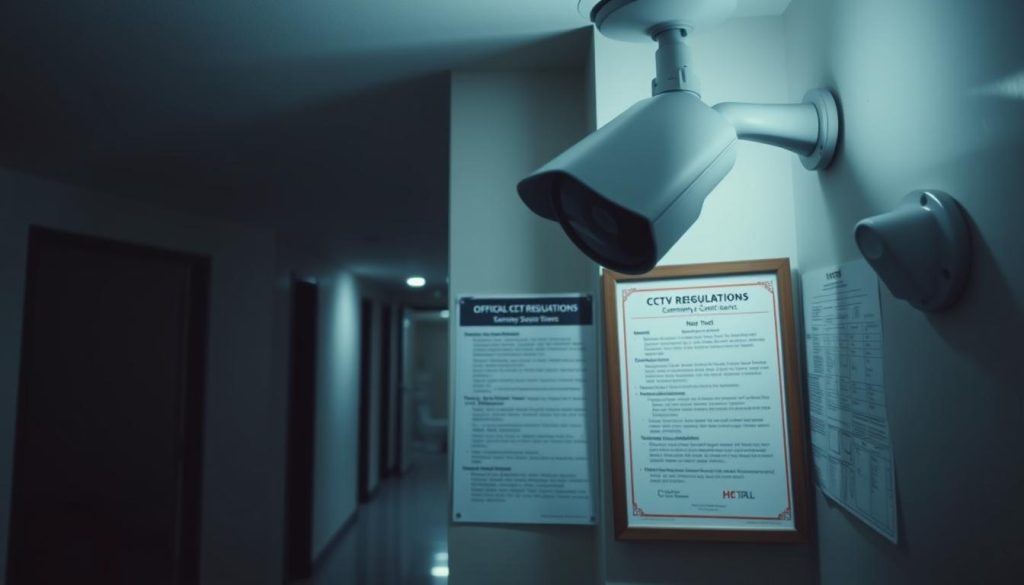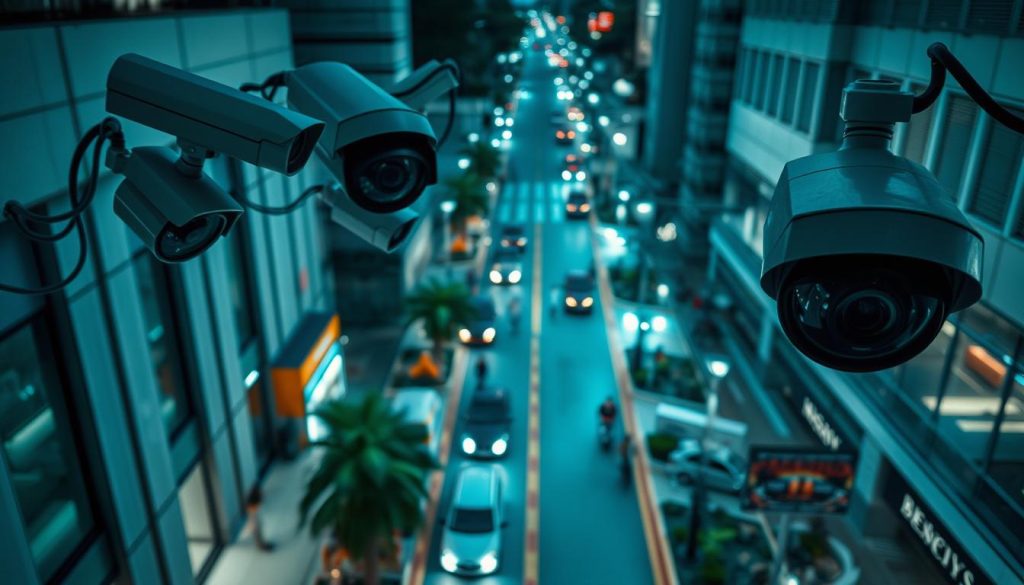Singapore now has over 500,000 CCTV cameras, making it key to know who is in charge. This part explains who manages CCTV and the rules they must follow. It’s important for both those who own and use CCTV to know their legal duties.
This knowledge helps them follow the law and protect privacy. We want to show how CCTV affects safety and raises important questions about its use.
Key Takeaways
- In Singapore, the number of CCTV cameras has risen significantly, highlighting the importance of proper management.
- CCTV ownership involves specific legal responsibilities that must be understood by both individuals and organizations.
- CCTV regulations ensure a balance between security and privacy in the community.
- Compliance with local laws is key to avoid legal problems with surveillance.
- Knowing the ethics of CCTV use helps build trust and safety in the community.
Understanding CCTV Systems in Singapore
CCTV technology is key in Singapore’s security. It uses advanced features in various cameras to boost surveillance. High-resolution images and night vision help monitor different places, keeping everyone safe.
Overview of CCTV Technology
CCTV systems have different cameras like dome, bullet, and PTZ. Each has its own benefits. Dome cameras are good for sneaky surveillance, while bullet cameras work well for long distances. PTZ cameras let you zoom in on areas you want.
Modern CCTV also has motion detection and remote access. These features make surveillance in Singapore better.
The Importance of CCTV Cameras for Security
CCTV cameras are vital in preventing crime. Studies show they lower crime rates, mainly in cities. They scare off criminals because they might get caught.
In Singapore, people trust CCTV to keep them safe. So, CCTV is a must in homes and businesses for security.
Legal Framework Surrounding CCTV in Singapore
In Singapore, the use of CCTV cameras is governed by strict laws. These laws set rules for installing and using CCTV systems. Knowing these laws helps ensure everyone follows them and protects people’s privacy.
Personal Data Protection Act (PDPA)
The Personal Data Protection Act (PDPA) is key to Singapore’s CCTV laws. It outlines legal obligations for CCTV use, focusing on personal data collection, use, and sharing. It requires people to know when they’re being recorded, making surveillance clear.
The Act also sets limits on how long CCTV footage can be kept. This helps prevent misuse of recorded data.
Town Council Regulations
Town Council bylaws are important for CCTV use in public areas. They require permission before installing cameras in shared spaces. Following these rules is critical, as breaking them can result in fines.
Understanding Town Council bylaws helps property owners and businesses. It ensures their CCTV systems meet local laws.
Who is responsible for CCTV?
Knowing who is responsible for CCTV is key to following the law and ethical standards. It’s not just about setting up cameras. It also includes managing data and respecting privacy. Owners must be careful about how their surveillance affects the community.
Ownership Responsibilities
Owners must take their owner obligations seriously to avoid misuse of surveillance. This means keeping equipment in good shape, storing footage safely, and only letting certain people see it. It’s also important to check the systems often to make sure they work right.
Owners should also have clear rules about who can see the footage and when. This helps keep things fair and secure.
- Ensure compliance with local laws and regulations.
- Protect stored data against unauthorized access.
- Regularly update surveillance technology to meet modern standards.
Privacy Considerations for Owners
Keeping data privacy in mind is vital for CCTV systems. Owners should know where their cameras point to avoid spying on neighbors or private moments. By focusing on surveillance ethics, owners can build trust in the community.
It’s important to tell people about the CCTV use. This helps create a safe and respectful environment for everyone.
Listening to the community can make surveillance better. Talking openly about CCTV helps keep everyone safe and secure. It shows that owners care about privacy and public safety.
Types of CCTV Ownership: Residential vs. Commercial
In Singapore, CCTV ownership rules differ a lot between homes and businesses. It’s key to know these rules to follow the law and have good surveillance.
Residential Ownership Regulations
Homeowners in Singapore can usually put cameras up without needing a permit. But, they must think about cameras in shared areas. Here, talking to local councils is important to avoid problems.
This shows how important it is to respect shared spaces while keeping your home safe.
Commercial Ownership Requirements
Businesses face tougher rules with commercial CCTV laws. They must follow the Personal Data Protection Act (PDPA). This means telling people about cameras and getting their okay.
Following these rules helps balance security with privacy. For businesses, having a clear surveillance policy is essential. It keeps them legal and safe.
Managing CCTV Systems in Residential Areas
Managing CCTV systems in homes needs community help. Getting residents involved builds trust and keeps privacy safe. It’s about working together, setting rules for watching, and solving problems together.
Community Involvement in Surveillance Decisions
When people share their thoughts, it makes surveillance better for everyone. Talking about cameras helps find blind spots and worries about privacy. Being open about where cameras are and why helps neighbors understand and work together.
Creating a plan for cameras and how to use footage is key. It shows everyone is in this together, watching out for each other.
Best Practices for Residential Installations
Good surveillance in homes means watching well but respecting privacy. Cameras should point where they won’t see private things. Talking to neighbors about cameras helps them feel okay with it.
Other good steps include:
- Creating a plan for where cameras go
- Setting rules for who can see footage
- Having meetings to talk about concerns and ideas
It’s important to find a balance between safety and privacy. Getting input from the community helps make a system everyone can agree on. For more on this, check out who’s in charge of CCTV.
CCTV Regulations for HDB Flats
Recent updates in HDB CCTV rules show a new approach to security in homes. Homeowners in high-rise HDB blocks can now install corridor-facing cameras without needing approval first. This change fits with new Singapore housing regulations that aim to boost security while respecting privacy.
Recent Changes in HDB Regulations
The latest rules on CCTV in HDB flats let homeowners put cameras in corridors. This move is a step forward in making shared living spaces safer. But, it’s important for residents to know their duties under these new rules. They should make sure their homes are safe and not invade their neighbors’ privacy.
Privacy Implications for HDB Residents
Putting cameras in corridors brings up big privacy concerns. While more surveillance might stop crimes, it’s key to remember the risk of privacy issues. Cameras should not watch people going in or out of their homes. Talking about these rules in the community helps keep peace and understanding among neighbors. For more info, check if you need a CCTV license for your setup.

Accountability of Business Owners for CCTV
Business owners have a big role in managing CCTV systems in their places. They must follow data management rules, like the Personal Data Protection Act (PDPA). This is key to keeping customers’ trust and protecting their privacy.
Responsibilities for Data Management
Handling data well is essential for businesses with CCTV. They need to set rules on how long footage is kept. Also, they must tell employees and customers about surveillance, making things clear.
Compliance with Privacy Laws
Following PDPA rules is more than just following the law. It’s about doing the right thing. Businesses should check their data handling often. They should also train staff on protecting data and keep an eye on their compliance.
CCTV Camera Maintenance and Upkeep
Keeping CCTV systems working well depends on regular care. This care includes cleaning, checking, and updating the cameras. It also meets legal standards. By doing these tasks, users make sure their cameras work right and catch everything they need to.
Importance of Regular Maintenance
Keeping CCTV systems in good shape is key. Regular checks can spot problems early. This means less chance of big issues later.
Cleaning lenses, checking wires, and updating software are musts. They help the cameras work well and catch everything they need to.
Legal Implications of Neglect
Not taking care of CCTV systems can lead to big legal troubles. If a system fails when it’s needed most, places can be left open to danger. Not keeping systems up can mean not following the law, which can lead to being blamed for things that happen without being watched.
By keeping CCTV systems in good shape, risks are lowered. This helps keep everyone safe.
Community Engagement on CCTV Usage
Community engagement is key in talking about CCTV. When people come together to discuss surveillance cameras, they share their thoughts. This helps everyone feel heard and builds trust in the community.
Being open about how CCTV works is important. It shows how these cameras help keep us safe without taking away our privacy. This openness helps reduce worries about being watched and shows CCTV’s positive role.
Working together on CCTV can lead to better practices. When people help decide how to use cameras, they’re more likely to support it. This way, we can keep our communities safe while respecting everyone’s privacy.

